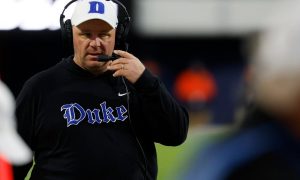Former NHL coach Mike Babcock has recently come under scrutiny for an alleged attempt to assess player character through invasive means. It’s reported that during his tenure as head coach of the Toronto Maple Leafs, Babcock asked forward Boone Jenner to surrender his phone for a so-called “character assessment” involving personal photos.
This incident sheds light on a controversial coaching method that raises ethical and privacy concerns. Coaches are typically responsible for mentoring and guiding players on the ice, focusing on their performance and development. However, delving into a player’s personal life, especially through private photos, crosses a boundary that many consider inappropriate.
Also Read| NFL: New York Jets QB Aaron Rodgers ruled out of season with torn Achilles
Boone Jenner, who currently plays for the Columbus Blue Jackets, was part of the Toronto Maple Leafs organization during Babcock’s tenure. It’s reported that Babcock asked Jenner to hand over his phone during a one-on-one meeting. This request was ostensibly to gain insight into Jenner’s character by perusing his personal photos.
This incident raises questions about the lengths some coaches may go to in their pursuit of understanding and motivating players. While coaches often employ various tactics to inspire performance, this approach ventures into a grey area. Personal privacy is a fundamental right, and players should not feel compelled to share intimate aspects of their lives to prove their character.
The alleged incident with Boone Jenner has sparked a broader conversation about the culture within professional sports and the power dynamic between coaches and players. It emphasizes the need for clear boundaries and guidelines regarding appropriate coaching methods, especially in relation to a player’s personal life.
Also Read| Keith Olbermann mocks Aaron Rodgers over early exit due to injury, blames ‘failure to vaccinate’
In light of this revelation, there is a growing call for professional sports organizations to establish protocols that safeguard players’ privacy and ensure that coaches adhere to ethical standards. It serves as a reminder that while coaches play a crucial role in player development, respecting personal boundaries is equally important for maintaining a healthy and productive athlete-coach relationship.







